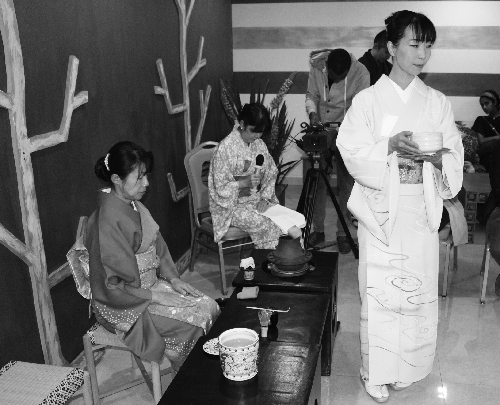
In Japan, there is a traditional tea ceremony called Sado. In Sado, the master of the ceremony invites guests to serve them with Japanese a traditional tea.
The spirit of Sado is based on Zen philosophy. Eight hundred years ago, during the Samurai period, as Zen became popular in Japan so did Sado. After that, Sen No Rikyu, who lived in the 16th century, laid the basis of Sado. The beautiful green tea powder used for Sado cermony is called Maccha.
In Japan, a highly developed spiritual culture has matured through a bowl of this powdered green tea. In Sado, there is a respect for everyone and everything without distinction of status or rank. The act of making a tea is called “Temae”.
All the procedures of Temae have to be observed beautifully and without an unnecessary movement. It is seen as an opportunity that comes once in a blue moon if not once in a lifetime. In the 16th century there was a civil war in Japan. There was a merchant who was serving the tea at the time. Due to this, many people came to know about the ceremony.
For the future proved as unpredictable people believed “today is our last day”. Thus they attached value to the ceremony by considering it as an event that takes place once in a lifetime. Japanese began to highly value every moment of their lives.
Chawan is in Japanese Tea bowl. The host pours the hot water into the Chawan. Then, he rises the chasen twice, and checks broken tines, and then rinses the chasen with the hot water. The host warms up the Chawan and wipes it.
There is sweet taking time before the tea. The host scoops the powdered green tea, and puts onto the chawan and the whisks it until it gets frothy.
They hope the bitterness of the tea will be balanced by the toothsome nature of the sweet. When the guest receives the tea, s/he should bow first.
When the host is about to finish the Temae, the host cleans the equipment’s in front of the guests. It is also a way of showing consideration to the guests. If the guest leaves without watching it, he might feel uncomfortable to leave the dirty equipment to the host.
The host and the guests are collaborating and showing consideration to each other. All the tools are cleaned and placed exactly where they were. The act represents, returning back everything borrowed from nature.
The basic principles of Sado are expressed in the words harmony, respect, purity, and tranquility. By learning Sado, Japanese seek to obtain an ultimate peace of mind. We are happy if you are able to feel the heart of Sado “Japanese”.
The Ethiopian Herald June 30, 2019
BY AMBO MEKASA




